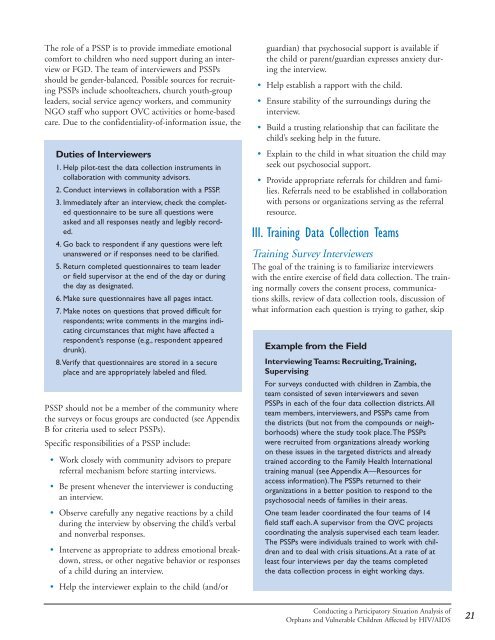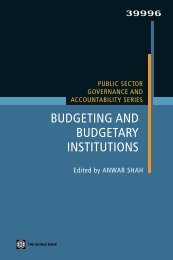Conducting a Participatory Situation Analysis of.pdf - Global HIV ...
Conducting a Participatory Situation Analysis of.pdf - Global HIV ...
Conducting a Participatory Situation Analysis of.pdf - Global HIV ...
You also want an ePaper? Increase the reach of your titles
YUMPU automatically turns print PDFs into web optimized ePapers that Google loves.
The role <strong>of</strong> a PSSP is to provide immediate emotional<br />
comfort to children who need support during an interview<br />
or FGD. The team <strong>of</strong> interviewers and PSSPs<br />
should be gender-balanced. Possible sources for recruiting<br />
PSSPs include schoolteachers, church youth-group<br />
leaders, social service agency workers, and community<br />
NGO staff who support OVC activities or home-based<br />
care. Due to the confidentiality-<strong>of</strong>-information issue, the<br />
Duties <strong>of</strong> Interviewers<br />
1. Help pilot-test the data collection instruments in<br />
collaboration with community advisors.<br />
2. Conduct interviews in collaboration with a PSSP.<br />
3. Immediately after an interview, check the completed<br />
questionnaire to be sure all questions were<br />
asked and all responses neatly and legibly recorded.<br />
4. Go back to respondent if any questions were left<br />
unanswered or if responses need to be clarified.<br />
5. Return completed questionnaires to team leader<br />
or field supervisor at the end <strong>of</strong> the day or during<br />
the day as designated.<br />
6. Make sure questionnaires have all pages intact.<br />
7. Make notes on questions that proved difficult for<br />
respondents; write comments in the margins indicating<br />
circumstances that might have affected a<br />
respondent’s response (e.g., respondent appeared<br />
drunk).<br />
8.Verify that questionnaires are stored in a secure<br />
place and are appropriately labeled and filed.<br />
PSSP should not be a member <strong>of</strong> the community where<br />
the surveys or focus groups are conducted (see Appendix<br />
B for criteria used to select PSSPs).<br />
Specific responsibilities <strong>of</strong> a PSSP include:<br />
• Work closely with community advisors to prepare<br />
referral mechanism before starting interviews.<br />
• Be present whenever the interviewer is conducting<br />
an interview.<br />
• Observe carefully any negative reactions by a child<br />
during the interview by observing the child’s verbal<br />
and nonverbal responses.<br />
• Intervene as appropriate to address emotional breakdown,<br />
stress, or other negative behavior or responses<br />
<strong>of</strong> a child during an interview.<br />
• Help the interviewer explain to the child (and/or<br />
guardian) that psychosocial support is available if<br />
the child or parent/guardian expresses anxiety during<br />
the interview.<br />
• Help establish a rapport with the child.<br />
• Ensure stability <strong>of</strong> the surroundings during the<br />
interview.<br />
• Build a trusting relationship that can facilitate the<br />
child’s seeking help in the future.<br />
• Explain to the child in what situation the child may<br />
seek out psychosocial support.<br />
• Provide appropriate referrals for children and families.<br />
Referrals need to be established in collaboration<br />
with persons or organizations serving as the referral<br />
resource.<br />
III. Training Data Collection Teams<br />
Training Survey Interviewers<br />
The goal <strong>of</strong> the training is to familiarize interviewers<br />
with the entire exercise <strong>of</strong> field data collection. The training<br />
normally covers the consent process, communications<br />
skills, review <strong>of</strong> data collection tools, discussion <strong>of</strong><br />
what information each question is trying to gather, skip<br />
Example from the Field<br />
Interviewing Teams: Recruiting,Training,<br />
Supervising<br />
For surveys conducted with children in Zambia, the<br />
team consisted <strong>of</strong> seven interviewers and seven<br />
PSSPs in each <strong>of</strong> the four data collection districts.All<br />
team members, interviewers, and PSSPs came from<br />
the districts (but not from the compounds or neighborhoods)<br />
where the study took place.The PSSPs<br />
were recruited from organizations already working<br />
on these issues in the targeted districts and already<br />
trained according to the Family Health International<br />
training manual (see Appendix A—Resources for<br />
access information).The PSSPs returned to their<br />
organizations in a better position to respond to the<br />
psychosocial needs <strong>of</strong> families in their areas.<br />
One team leader coordinated the four teams <strong>of</strong> 14<br />
field staff each.A supervisor from the OVC projects<br />
coordinating the analysis supervised each team leader.<br />
The PSSPs were individuals trained to work with children<br />
and to deal with crisis situations.At a rate <strong>of</strong> at<br />
least four interviews per day the teams completed<br />
the data collection process in eight working days.<br />
<strong>Conducting</strong> a <strong>Participatory</strong> <strong>Situation</strong> <strong>Analysis</strong> <strong>of</strong><br />
Orphans and Vulnerable Children Affected by <strong>HIV</strong>/AIDS<br />
21















